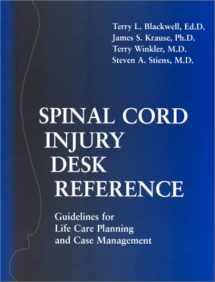
Spinal Cord Injury Desk Reference: Guidelines for Life Care Planning and Case Management
Book details
Summary
Description
"This text provides a quick, easy-to-understand, comprehensive, evidence-based reference for health care practitioners who formulate life care plans for persons with SCI. Features that will facilitate use by practitioners includes a variety of reference materials for health care professionals who provide life care planning/case management for SCI. Life care planning/case management practitioners would best be served by utilizing this text as a source of information and a guide from which to incorporate their professional knowledge, judgment, and ethical responsibilities when working with individuals with SCI to meet the challenge of addressing their unique long-term care needs. It is our hope this text will provide readers with tools and insights for competently addressing the long-term consequences of SCI.
This text arose out of a perceived need to have a single reference that would both contain information and serve as a reminder of areas central to the life care planning process for persons with SCI. It offers practitioners a single, easy-to-use resource that summarizes - in a clear, understandable way with easily accessible references - a body of studies and research on SCI that have important implications for life care planning and case management.
This text is an introduction to the basic aspects related to understanding SCI, including epidemiology, functional classification, and complications related to aging a with disability. In addition, it covers functional outcomes, potential associated costs, long-term management and care considerations, model LCP guidelines, and legislative, organizational, and agency resources.
This need for a continuum of care presents great challenges to health care professionals as well as to individuals with SCI and their families. Life care planning, which entered into the rehabilitation scene in the late 1970s and early 1980s, has proven to be one way of meeting this challenge by providing an organized framework of services, recommendations, and requirements for long-term care management. By using a consistent methodology in assessing the individual needs of the person with SCI, the life care plan (LCP) helps the health care professionals as well as the person with SCI acquire a comprehensive understanding of the immediate and long-term care requirements necessary to maximize productivity and independence.
Although the text was written primarily for life care planning and case management practitioners, it can also be useful to other professionals who may be involved with the long-term care and management needs of people with SCI. Included in this group are primary care and speciality care physicians, nurses, rehabilitation counselors, therapists, insurers/HMOs, attorneys, governmental agencies, disability organizations, and educators, as well as people with SCI and their families.
"

We would LOVE it if you could help us and other readers by reviewing the book
Book review



